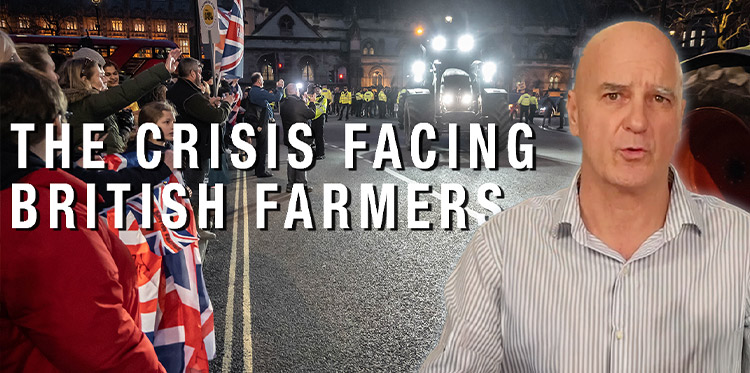The crisis facing British farmers

At Devon Duvets, we’re proud to be part of a network that champions British craftsmanship, sustainability, and local industries. But today, we need to talk about something that impacts all of us - the future of British farming. This isn’t just about farmers; it’s about every meal we eat, every product we buy, and the stability of our entire nation.
The state of British farming
Over the past four decades, British farming has faced an undeniable decline. By 2023, the number of farm holdings had decreased to around 209,000, reflecting trends driven by urbanisation, economic pressure, and technological change. This reduction raises concerns about sustainability and food security - a stark contrast to the post-World War II commitment in the 1947 Agricultural Act, which vowed that Britain would never again face food rationing.
Back in the 1980s, British farmers produced approximately 78% of the food we consumed. Today, that figure has fallen to just 62%. This leads us to an important question: what does our future food security look like?


More than just farming
Agriculture isn’t just about the farmers tending to their fields; it supports a vast ecosystem of businesses, from local grocery stores and butchers to breweries and bakers. In 2022, the agri-food sector contributed an impressive £146.7 billion to the UK economy, accounting for 6.5% of the national Gross Value Added (GVA). To put it simply, GVA shows the true economic contribution of an industry by measuring the value it adds after production costs are subtracted. It’s a pillar of our economy that we can’t afford to weaken.
This sector also supports 4.4 million jobs, representing 14% of the UK workforce. Any disruption in farming sends ripples through this workforce and the wider economy, impacting not only those directly employed in agriculture but also everyone involved in food production, retail, and related services.
The reality for farmers
Despite their critical role, UK farmers face considerable challenges. According to DEFRA, between 2020 and 2023, 19% of mixed farms operated at a loss, and 23% reported profits under £25,000. The phrase “a farmer doesn’t own a farm; they only look after it for the next generation” reflects the long-term stewardship and sacrifice that characterise farming life. While farmers may hold valuable assets, their income is often modest. It’s a reality where they “live poor and die rich,” with most wealth tied up in land and equipment passed down to future generations.
The threat of farm closures
What if current government measures result in 5% of farmers leaving the industry? That would mean the closure of approximately 10,450 farms, potentially leading to widespread job losses and a significant hit to our food security. The social impact would be profound, affecting rural communities that rely on farming not just for employment, but for their cultural and economic backbone. It’s not just about numbers; it’s about lives, heritage, and the ability to put food on our tables.


The cost of importing food
If we produce less domestically and increase our reliance on imports, we open ourselves up to higher transport costs, food price inflation, and greater ecological pressure. In an increasingly unstable world, being dependent on foreign supply chains is a risk. Additionally, many exporting countries do not uphold the same environmental standards as we do in the UK, making imported food more ecologically damaging. How does that align with our environmental goals? Are we willing to ignore pollution just because it happens outside our borders?
Common Sense vs. Politics
Here’s where common sense and politics diverge. While the government often claims to listen to the people, we must ask: who are they actually listening to? Do they understand the complexities of farming and the consequences their policies can have? Decisions shouldn’t be driven by budget figures alone. We need to look at the broader picture: economic, social, and environmental impacts on our communities.
Losing more farmers would lead to higher food prices and inflation that impacts everyone. The ripple effects reach from the hops used in your local brewery to the shelves of your nearest grocery store. Ultimately, it’s the everyday consumer - ordinary people like you and me - who bear the brunt of these changes.


The hard work of farmers
Farmers work tirelessly to bring food to British tables. Jeremy Clarkson’s farming series may have brought attention to the trials of farm life, but it also revealed the relentless, day-to-day struggles of real farmers. They work long hours, invest significant sums of money at personal risk, and face unpredictable challenges from the weather to market shifts.
Why supporting British farmers matters
So, should we support British farmers? Absolutely. If we care about the food on our plates, jobs in our communities, and the future of our environment, supporting British farming isn’t just an option - it’s common sense. Farmers can’t do it alone. We, as consumers, have the power and responsibility to stand with them.
At Devon Duvets, we believe that when we support our farmers through making our products, we’re supporting Britain as a whole. Think about what farming means to our nation and what it would mean to lose it. Let’s have this conversation, share our thoughts, and continue to support those who work tirelessly for us all. Let’s show our support for British farmers and give them the appreciation they deserve.




